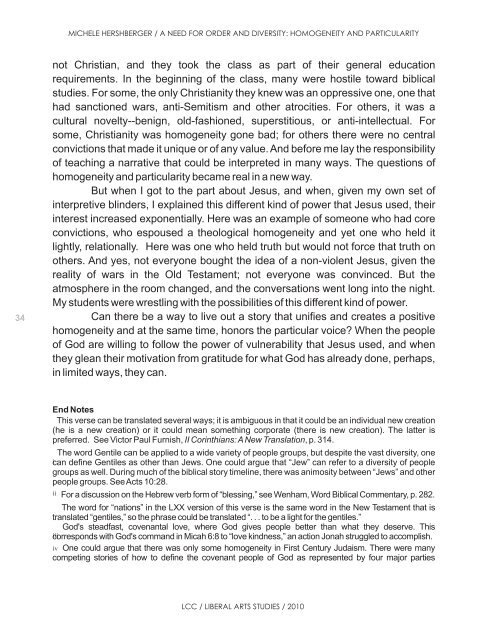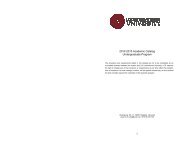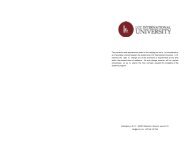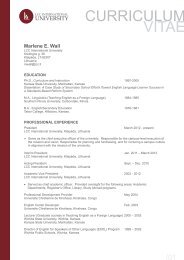lcc liberal arts studies / 2010 volume iii - LCC International University
lcc liberal arts studies / 2010 volume iii - LCC International University
lcc liberal arts studies / 2010 volume iii - LCC International University
Create successful ePaper yourself
Turn your PDF publications into a flip-book with our unique Google optimized e-Paper software.
34<br />
MICHELE HERSHBERGER / A NEED FOR ORDER AND DIVERSITY: HOMOGENEITY AND PARTICULARITY<br />
not Christian, and they took the class as part of their general education<br />
requirements. In the beginning of the class, many were hostile toward biblical<br />
<strong>studies</strong>. For some, the only Christianity they knew was an oppressive one, one that<br />
had sanctioned wars, anti-Semitism and other atrocities. For others, it was a<br />
cultural novelty--benign, old-fashioned, superstitious, or anti-intellectual. For<br />
some, Christianity was homogeneity gone bad; for others there were no central<br />
convictions that made it unique or of any value. And before me lay the responsibility<br />
of teaching a narrative that could be interpreted in many ways. The questions of<br />
homogeneity and particularity became real in a new way.<br />
But when I got to the part about Jesus, and when, given my own set of<br />
interpretive blinders, I explained this different kind of power that Jesus used, their<br />
interest increased exponentially. Here was an example of someone who had core<br />
convictions, who espoused a theological homogeneity and yet one who held it<br />
lightly, relationally. Here was one who held truth but would not force that truth on<br />
others. And yes, not everyone bought the idea of a non-violent Jesus, given the<br />
reality of wars in the Old Testament; not everyone was convinced. But the<br />
atmosphere in the room changed, and the conversations went long into the night.<br />
My students were wrestling with the possibilities of this different kind of power.<br />
Can there be a way to live out a story that unifies and creates a positive<br />
homogeneity and at the same time, honors the particular voice? When the people<br />
of God are willing to follow the power of vulnerability that Jesus used, and when<br />
they glean their motivation from gratitude for what God has already done, perhaps,<br />
in limited ways, they can.<br />
End Notes<br />
This verse can be translated several ways; it is ambiguous in that it could be an individual new creation<br />
(he is a new creation) or it could mean something corporate (there is new creation). The latter is<br />
preferred. See Victor Paul Furnish, II Corinthians: A New Translation, p. 314.<br />
The word Gentile can be applied to a wide variety of people groups, but despite the vast diversity, one<br />
can i define Gentiles as other than Jews. One could argue that “Jew” can refer to a diversity of people<br />
groups as well. During much of the biblical story timeline, there was animosity between “Jews” and other<br />
people groups. See Acts 10:28.<br />
ii For a discussion on the Hebrew verb form of “blessing,” see Wenham, Word Biblical Commentary, p. 282.<br />
The word for “nations” in the LXX version of this verse is the same word in the New Testament that is<br />
translated “gentiles,” so the phrase could be translated “. . . to be a light for the gentiles.”<br />
God's steadfast, covenantal love, where God gives people better than what they deserve. This<br />
corresponds <strong>iii</strong> with God's command in Micah 6:8 to “love kindness,” an action Jonah struggled to accomplish.<br />
iv<br />
One could argue that there was only some homogeneity in First Century Judaism. There were many<br />
competing stories of how to define the covenant people of God as represented by four major parties<br />
<strong>LCC</strong> / LIBERAL ARTS STUDIES / <strong>2010</strong>






